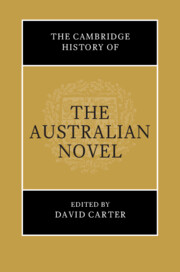Book contents
- The Cambridge History of the Australian Novel
- The Cambridge History of the Australian Novel
- Copyright page
- Contents
- Figures
- Contributors
- Acknowledgements
- Introduction
- 1 The Global Invention of the Australian Novel
- 2 Colonial Adventure Novels
- 3 Beyond Britain and the Book
- 4 Transnational Optics
- 5 The Novel in the Late Colonial Period
- 6 Love Is Not Enough
- 7 The Australian Crime Novel, 1830–1950
- 8 The Novel Nation
- 9 Selling Australian Stories to the World
- 10 Women Writers and the Emerging Urban Novel, 1930–1952
- 11 The National Trilogy and Mining
- 12 Nation and Environment in the Twentieth-Century Novel
- 13 Henry Handel Richardson, Christina Stead and the Transnational Fiction of Provincial Development
- 14 The Mid-Century Australian Novel and the End of World History
- 15 Race, Romance and Anxiety
- 16 Whiteness, Aboriginality and Representation in the Twentieth-Century Australian Novel
- 17 When the Twain Meet
- 18 From Bunyip to Boom
- 19 Unsettling Archive
- 20 The Novel at Arms
- 21 ‘Our Least-Known Best Seller’
- 22 Writing, Women and the Australian Novel
- 23 White Lies
- 24 The Economics of the Literary Novel
- 25 Mabo, History, Sovereignty
- 26 Indigenous Futurism
- 27 The Regional Novel in Australia
- 28 Children’s and Young Adult Literature
- 29 Grunge, Nation and Literary Generations
- 30 The Making of the Asian Australian Novel
- 31 Screening the Australian Novel, 1971–2020
- 32 Australian Fantasy, Crime and Romance Fiction in the Twentieth and Twenty-First Centuries
- 33 Uncertain Futures
- 34 A (Sovereign) Body of Work
- 35 The Novel Road to the Global South
- 36 The Fortunes of the Miles Franklin
- 37 The Arab Australian Novel
- 38 Riddling the Nation
- 39 Migrant Writing and the Invention of Australia
- Selective Bibliography: Studies of the Australian Novel, 2000–2021
- Index
13 - Henry Handel Richardson, Christina Stead and the Transnational Fiction of Provincial Development
Published online by Cambridge University Press: 28 June 2023
- The Cambridge History of the Australian Novel
- The Cambridge History of the Australian Novel
- Copyright page
- Contents
- Figures
- Contributors
- Acknowledgements
- Introduction
- 1 The Global Invention of the Australian Novel
- 2 Colonial Adventure Novels
- 3 Beyond Britain and the Book
- 4 Transnational Optics
- 5 The Novel in the Late Colonial Period
- 6 Love Is Not Enough
- 7 The Australian Crime Novel, 1830–1950
- 8 The Novel Nation
- 9 Selling Australian Stories to the World
- 10 Women Writers and the Emerging Urban Novel, 1930–1952
- 11 The National Trilogy and Mining
- 12 Nation and Environment in the Twentieth-Century Novel
- 13 Henry Handel Richardson, Christina Stead and the Transnational Fiction of Provincial Development
- 14 The Mid-Century Australian Novel and the End of World History
- 15 Race, Romance and Anxiety
- 16 Whiteness, Aboriginality and Representation in the Twentieth-Century Australian Novel
- 17 When the Twain Meet
- 18 From Bunyip to Boom
- 19 Unsettling Archive
- 20 The Novel at Arms
- 21 ‘Our Least-Known Best Seller’
- 22 Writing, Women and the Australian Novel
- 23 White Lies
- 24 The Economics of the Literary Novel
- 25 Mabo, History, Sovereignty
- 26 Indigenous Futurism
- 27 The Regional Novel in Australia
- 28 Children’s and Young Adult Literature
- 29 Grunge, Nation and Literary Generations
- 30 The Making of the Asian Australian Novel
- 31 Screening the Australian Novel, 1971–2020
- 32 Australian Fantasy, Crime and Romance Fiction in the Twentieth and Twenty-First Centuries
- 33 Uncertain Futures
- 34 A (Sovereign) Body of Work
- 35 The Novel Road to the Global South
- 36 The Fortunes of the Miles Franklin
- 37 The Arab Australian Novel
- 38 Riddling the Nation
- 39 Migrant Writing and the Invention of Australia
- Selective Bibliography: Studies of the Australian Novel, 2000–2021
- Index
Summary
Expatriate women writers Henry Handel Richardson and Christina Stead produced field-defining novels of transnational scale and aesthetic ambition that engaged both the matter of Australia and the locations from which they produced and circulated their writing. For Richardson, the provocations of the ‘modern breakthrough’ in Scandinavian literature were central to her work with the realist novel. Stead’s girlhood saturation in gothic fairy-tales, the French novel and the Australian tradition expanded into restless experiments with the novel in the avant-garde circles of Paris (1929–34), before her negotiation of literary debates in France, England and America. The narrative strand of Kunstlerroman in Richardson’s The Fortunes of Richard Mahony (1917–29) and Stead’s The Man Who Loved Children (1940) introduces the developing provincial subject as crucial to the vision of familial and national development, principally in the relation between child and parents. Stead and Richardson produced groundbreaking versions of the Kunstlerroman narrative, disrupting a stable nineteenth-century structure centred on stories about young artistic men. These women writers produced narratives of talented colonial subjects – young colonial children and provincial teenage daughters – situated outside these structures of power, and foregrounded their disruptive perceptions of flawed patriarchal-imperial modes of authority.
Keywords
- Type
- Chapter
- Information
- The Cambridge History of the Australian Novel , pp. 218 - 235Publisher: Cambridge University PressPrint publication year: 2023



